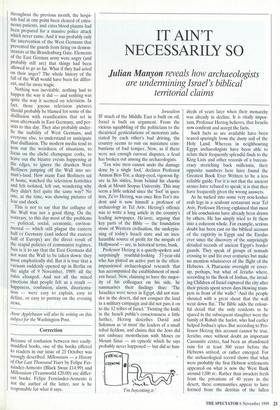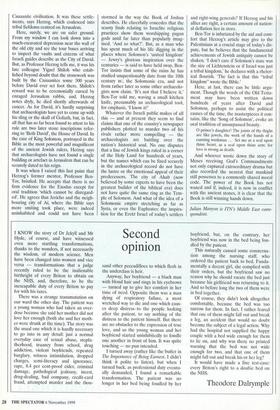IT AIN'T NECESSARILY SO
Julian Manyon reveals how archaeologists are undermining Israel's biblical territorial claims
Jerusalem IF much of the Middle East is built on oil, Israel is built on argument. From the vicious squabbling of the politicians to the theatrical gesticulations of motorists infu- riated by each other's bad driving, the country seems to run on miniature com- bustions of bad temper. Now, as if there were not enough current disputes, a feud has broken out among the archaeologists.
`Ten wise men cannot undo the damage done by a single fool,' declares Professor Amnon Ben-Tor, a sharp-eyed, vigorous fig- ure in his sixties, from behind his chaotic desk at Mount Scopus University. This may seem a little unkind since the 'fool' in ques- tion, Ze'ev Herzog, was once Ben-Tor's stu- dent and is now himself a professor of archaeology in Tel Aviv. Herzog's offence was to write a long article in the country's leading newspaper, Ha'aretz, arguing that key parts of the Bible — the foundation stone of Western civilisation, the underpin- ning of today's Israeli state and an inex- haustible source of profit for the moguls of Hollywood — are, in historical terms, bunk.
Professor Herzog is a quietly-spoken and surprisingly youthful-looking 57-year-old who has played an active part in the often- impassioned archaeological research that has accompanied the establishment of mod- ern Israel. Now, claiming to have the major- ity of his colleagues on his side, he summarises their findings thus: `The Israelites were never in Egypt, did not wan- der in the desert, did not conquer the land in a military campaign and did not pass it on to the 12 tribes of Israel.' Twisting the knife in the Israeli public's consciousness a little further, Herzog describes David and Solomon as `at most' the leaders of a small tribal fiefdom, and claims that the Jews did not embrace monotheism with Moses on Mount Sinai — an episode which he says probably never happened — but did so hun- 'I'm boycotting it.' dreds of years later when their monarchy was already in decline. It is vitally impor- tant, Professor Herzog believes, that Israelis now confront and accept the facts.
Such facts as are available have been teased sparingly from the dusty soil of the Holy Land. Whereas in neighbouring Egypt archaeologists have been able to relate their frequently splendid finds to the King Lists and other records of a bureau- cracy stretching back millennia, their opposite numbers here have found the Greatest Book Ever Written to be a less reliable guide. For it is not that the ancient stones have refused to speak; it is that they have frequently given the wrong answers.
As he tucked into some very non-kosher crab legs in a seafront restaurant near Tel Aviv, Professor Herzog explained that most of his conclusions have already been drawn by others. He has simply tried to fit them into a coherent whole. For example, serious doubt has been cast on the biblical account of the captivity in Egypt and the Exodus ever since the discovery of the surprisingly detailed records of ancient Egypt's border guards. They speak of groups of nomads crossing to and fro over centuries but make no mention whatsoever of the flight of the Hebrews. A Pharaonic oversight or cover- up, perhaps, but what of Jericho where, according to the Book of Joshua, the invad- ing Children of Israel captured the city after their priests spent seven days blowing trum- pets in front of the walls? `And the people shouted with a great shout that the wall went down flat.' The Bible adds the colour- ful detail that the only residents to be spared in the subsequent slaughter were the family of Rahab the harlot, who had earlier helped Joshua's spies. But according to Pro- fessor Herzog this account cannot be true. Jericho, once without doubt an important Canaanite centre, had been an abandoned ruin for at least 300 years before the Hebrews arrived, or rather emerged. For the archaeological record shows that what were probably the first Hebrew settlements appeared on what is now the West Bank around 1200 Bc. Rather than invaders fresh from the privations of 40 years in the desert, these communities appear to have formed from the detritus of the fallen Canaanite civilisation. It was these settle- ments, says Herzog, which coalesced into tribal fiefdoms centred on Jerusalem.
Here, surely, we are on safer ground. From my window I can look down into a much-excavated depression near the wall of the old city and see the tour buses arriving to inspect the vaults and cisterns of what Israeli guides describe as the City of David. But, as Professor Herzog tells me, it was his late colleague Yigael Shiloh who estab- lished beyond doubt that the stonework was built by the Canaanites some 500 years before David ever set foot there. Shiloh's reward was to be ceremonially cursed by enraged Jerusalem rabbis, and, Herzog notes dryly, he died shortly afterwards of cancer. As for David, it's hardly surprising that archaeologists have yet to come up with his sling or the skull of Goliath, but, in fact, all that has so far been found to attest to his rule are two later stone inscriptions refer- ring to 'Beth David', the House of David. In the case of King Solomon, portrayed in the Bible as the most powerful and magnificent of the ancient Jewish rulers, Herzog says that archaeologists have not found a single building or artefact in Jerusalem that can be securely dated to his reign.
It was when I raised this last point that Herzog's former mentor, Professor Ben- Tor, bristled. He accepts that there is no firm evidence for the Exodus except for oral tradition 'which cannot be disregard- ed'. He agrees that Jericho and the neigh- bouring city of Ai, where the Bible says more smiting took place, were indeed uninhabited and could not have been stormed in the way the Book of Joshua describes. He cheerfully concedes that the scanty finds relating to Israelite religious practices show them worshipping pagan gods until far later than popularly imag- ined. 'And so what?'. But, as a man who has spent much of his life digging in the places where Solomon's 'united kingdom' — Jewry's glorious inspiration over the centuries — is said to have held sway, Ben- Tor insists that some of the ruins he has studied unquestionably date from the 10th century BC, the Solomonic era, and not from rather later as some other archaeolo- gists now claim. 'It's not that I believe it,' Ben-Tor told me, waving a small kitchen knife, presumably an archaeological tool, for emphasis, 'I know it!'
Whatever the Israeli public makes of all this — and at present they seem to find claims that one of the country's newspaper publishers plotted to murder two of his rivals rather more compelling — the archaeologists are battling over the nation's historical soul. No one disputes that a line of Jewish kings ruled in a corner of the Holy Land for hundreds of years, but the names which can be fixed securely in the archaeological record do not have the lustre or the emotional appeal of their predecessors. The city of Ahab (now believed by some experts to have been the greatest builder of the biblical era) does not have quite the same ring as the Tem- ple of Solomon. And what of the idea of a Solomonic empire stretching as far as Syria, or even the Euphrates: the inspira- tion for the Eretz Israel of today's settlers and right-wing generals? If Herzog and his allies arc right, a certain amount of nation- al deflation lies in store.
Ben-Tor is infuriated by the aid and com- fort that Herzog's article may give to the Palestinians at a crucial stage of today's dis- pute, but he believes that the fundamental achievements of Jewish antiquity cannot be shaken. `I don't care if Solomon's state was the size of Lichtenstein or if Israel was just a tribal kingdom,' he declares with a rhetor- ical flourish. 'The fact is that this "tribal kingdom" wrote the Bible.'
Here, at last, there can be little argu- ment. Though the words of the Old Testa- ment may have been written down hundreds of years after David and Solomon, perhaps to assist the political causes of the time, the masterpieces it con- tains, like the 'Song of Solomon', evoke an oral tradition of unsurpassed beauty.
0 prince's daughter! The joints of thy thighs are like jewels, the work of the hands of a cunning workman ... Set me as a seal upon thine heart, as a seal upon thine arm: for love is strong as death.
And whoever wrote down the story of Moses receiving God's Commandments not only captured extraordinary drama but also recorded the nearest that mankind still possesses to a commonly shared moral code. The power of the Book has not waned and if, indeed, it is now in conflict with the ancient stones, it is clear that the Book is still winning hands down.
Julian Manyon is ITN's Middle East corre- spondent.



























































































 Previous page
Previous page